WHEN STRONG LEADERSHIP ISN'T WHAT IT IS CRACKED UP TO BE - Those in charge should resist the temptation to think it's all about them
The greatest fear of a modern leader is to appear weak. The appeal is so great it seems some leaders would rather appear strong and wrong than weak and right. For the modern democratic politician, hesitancy is seized on as evidence of drift; for authoritarian leaders, fragility suggests to others that the end is near. So, all kinds of leaders today must look in charge. Even if they don’t know what to do next, which is probably most of the time.
Archie Brown, Emeritus Professor of Politics at Oxford University, in his most recent book, The Myth of the Strong Leader (Vintage 2015), distinguishes between two kinds of leadership: transformational and re-defining. The former is found in people responsible for systemic change in their polity; Mikhail Gorbachev and Nelson Mandela are fine examples of this. The latter is where leaders are able to change the terms of the debate and stretch the understanding of what is politically possible. Whole governments might be responsible for the latter, like the Attlee administration which ushered in the NHS and the post-war Welfare State. Individual politicians can too, like Margaret Thatcher who re-shaped the way this post-war settlement was viewed.
Though transformational leadership only falls to the few, born at the right time and with the right gifts, all modern political leaders aspire to re-defining the terms of national debate. Yet even this is available to only a number. There are only so many times the political debate can change decisively; mostly it evolves imperceptibly.
While the media, and it is assumed perhaps without proof, the population, longs for strong individual leadership, this is not always possible or desirable. Democracies create checks and balances to ensure one individual cannot impose their will on everyone else; to expect leaders to circumnavigate these necessary obstacles to make free and unfettered choices is self-defeating. Leaders simply don’t have enough wisdom or time to get it right every time. This is why nations prefer to rule by Cabinet, Parliament and Congress, to ensure the collective wisdom is found and the will summoned to initiate change.
The alternative is authoritarian rule where one individual is responsible for the big decisions. The power they wield is not commensurate with the wisdom they possess and so more mistakes are made. The very reason authoritarian regimes emphasise the personal brilliance of the leader is because they lack it, but must appear not to.
Within the Church, leadership should emerge from shared prayer and intercession. The Christian leader is not above this process and neither should he or she be separate from it. In praying together, the people of God submit themselves as a group to the sovereign will of God.
The political scientist, Joseph Nye, has succinctly defined a leader as someone ‘who helps a group create and achieve shared goals’. There is an unfashionable element of consensus in this definition. A leader listens to others, identifies emerging patterns and helps to shape them into a recognisable form to act upon. It is tempting to misinterpret scripture to present people like Moses, Joshua, Samuel, Peter and Paul as implacably strong leaders who uniquely listened to God and delivered his will. It takes only a little more than a cursory inspection of their stories to see the hand of others in their leadership.
The outcome of a course of action should be indelibly branded with God’s holy name. The post-war economic reconstruction of Europe was one of the finest achievements of the last century, paving the way for a generation of peace and prosperity in a ravaged continent. The enormous rescue plan brokered and paid for by the United States is called the Marshall Plan. The President at the time was Harry Truman. George Marshall pulled it together as Secretary of State. How many of today’s top leaders put in that position would have resisted the temptation to call it the Truman Plan? When the work of God gets done, it is the name of God that should be exalted.
POPULAR ARTICLES

Obama's Covert Wars
The use of drones is going to change warfare out of all recognition in the next decades.

Through A Glass Starkly
Images of traumatic incidents caught on mobile phone can be put to remarkable effect.

What Are British Values?
Is there a British identity and if so, what has shaped the values and institutions that form it?



